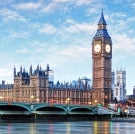Britain is on the precipice of a “third nuclear age” in which it must face down multiple threats, the head of the armed forces has warned.
In an annual address at the Royal United Services Institute (Rusi) defence think tank in London, chief of the defence staff Admiral Sir Tony Radakin said Britain and its western allies were facing “wild threats” from the alliance of China, Russia, Iran and North Korea.
After the first phase of the nuclear age during the Cold War and the second age defined by disarmament, Sir Tony said the world was now entering a third era in which nuclear threats and exercises are becoming more prevalent again.
“From Russia, we have seen wild threats of tactical nuclear use, large-scale nuclear exercises and simulated attacks against Nato countries, all designed to coerce us from taking the action required to maintain stability,” he said.
“China’s nuclear build-up poses a two-peer challenge to the United States. Iran’s failure to co-operate with the International Atomic Energy Agency is a concern, and North Korea’s ballistic missile programme and erratic behaviour present a regional and, increasingly, a global threat.”
The self-described optimist was quick to caveat his comments, however, saying there would be only a “remote chance” Russia would directly attack or invade the UK if the two countries were at war.
He laid out the landscape of British defence in a wide-ranging speech, after a minister warned the Army would be wiped out in as little as six months if forced to fight a war on the scale of the Ukraine conflict.
He told the audience Britain needed to be “clear-eyed in our assessment” of the threats it faces, adding: “That includes recognising that there is only a remote chance of a significant direct attack or invasion by Russia on the United Kingdom, and that’s the same for the whole of Nato.”
Moscow “knows the response will be overwhelming”, he added, but warned the nuclear deterrent needed to be “kept strong and strengthened”.
Sir Tony added: “We are at the dawn of a third nuclear age, which is altogether more complex. It is defined by multiple and concurrent dilemmas, proliferating nuclear and disruptive technologies and the almost total absence of the security architectures that went before.”
He said the UK’s nuclear arsenal is “the one part of our inventory of which Russia is most aware and has more impact on (president Vladimir) Putin than anything else”.
Successive British governments had invested “substantial sums of money” in renewing nuclear submarines and warheads because of this, he added.
Source: independent.co.uk



